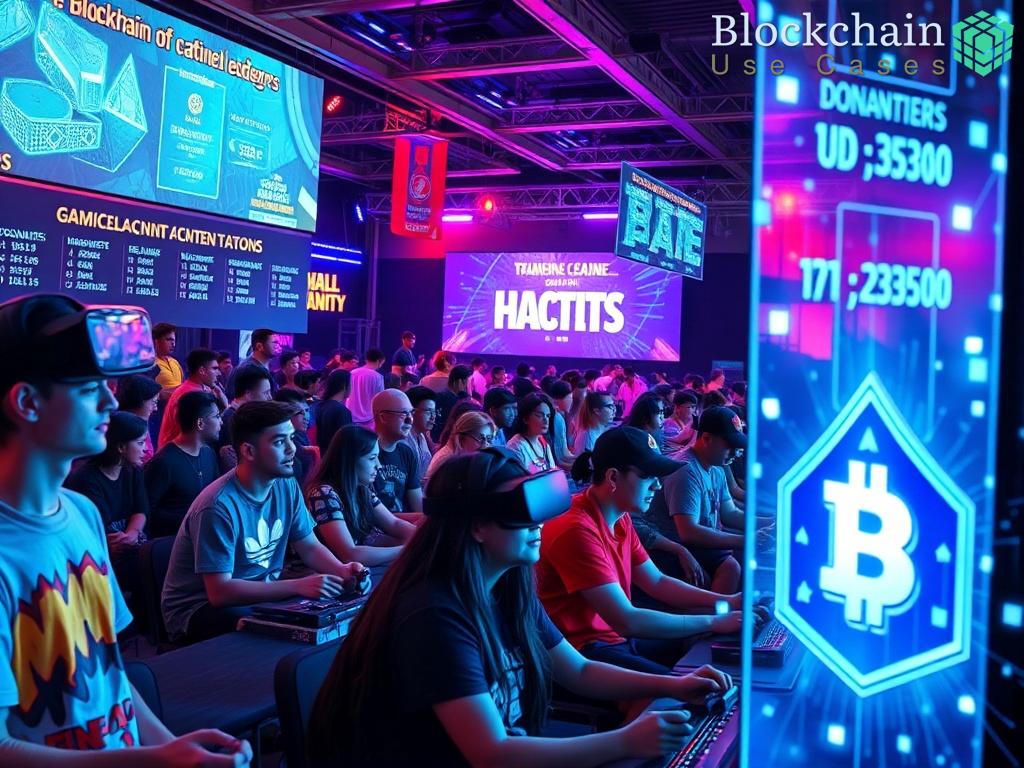Blockchain Technology: A Game Changer for Charity Transparency

In recent years, the gaming industry has embraced charity events as a means to contribute positively to society. However, the need for transparency in how funds are raised and distributed has become increasingly critical. Enter blockchain technology—a revolutionary solution that promises to enhance accountability within gaming charity events and fundraisers. This article delves into how blockchain can transform the landscape of charitable giving through its inherent properties of transparency and security.
Blockchain operates on a decentralized ledger system that records every transaction across a network of computers. This ensures that all interactions are visible, immutable, and verifiable, which is crucial for maintaining trust in charitable operations. By integrating blockchain into fundraising initiatives, participants can track how funds are utilized in real-time, fostering a culture of transparency that traditional fundraising methods often lack.
Here are several mechanisms through which blockchain enhances transparency:
- Decentralization: No single entity has control, reducing the risk of fraud.
- Immutable Records: Once a transaction is recorded, it cannot be altered, ensuring trust.
- Real-Time Tracking: Donors can monitor fund allocation and usage instantly.
- Smart Contracts: Automated agreements that execute actions based on predefined conditions, enhancing accountability.
The integration of blockchain into gaming charity events is not just a trend; it represents a paradigm shift towards a more transparent and trustworthy fundraising model. As more organizations begin to adopt this technology, we can expect significant changes in how funds are raised and managed. The potential for gamification combined with blockchain could lead to innovative fundraising strategies that enhance engagement while ensuring that every dollar is accounted for.
Consider the following table that illustrates the comparison between traditional fundraising methods and blockchain-enabled fundraising:
| Aspect | Traditional Fundraising | Blockchain-Enabled Fundraising |
|---|---|---|
| Transparency | Limited visibility | Complete visibility of transactions |
| Accountability | Often reliant on trust | Immutable records ensure accountability |
| Cost Efficiency | Higher administrative costs | Lower overhead costs through automation |
| Donor Engagement | Occasional updates | Real-time tracking and updates |
Decentralized Ledger Systems: Ensuring Accountability in Fundraising

The landscape of fundraising is evolving, and at the core of this transformation lies the concept of decentralized ledger systems. Unlike traditional methods that often rely on centralized entities, these systems provide an innovative framework that enhances accountability in charitable endeavors. By leveraging blockchain technology, gaming charity events can not only optimize their operations but also regain the trust of donors through verifiable and tamper-proof data.
Decentralized ledger systems operate under the principle of distributed control, which inherently mitigates the risks associated with fraud and mismanagement of funds. In a typical fundraising scenario, a central authority oversees the collection and distribution of donations, creating potential points of failure and mistrust. However, with blockchain, every transaction is recorded across multiple nodes within the network, ensuring that no single party can manipulate the data. This level of transparency empowers donors by providing them with a clear view of how their contributions are being utilized.
Furthermore, the concept of immutability plays a crucial role in ensuring accountability. Once a transaction is entered into the blockchain, it becomes a permanent record that cannot be altered or deleted. This characteristic is particularly significant in the context of charitable giving, where donors often seek assurance that their funds are being directed towards the intended purpose. By incorporating immutable records into gaming charity events, organizations can bolster confidence among their supporters, leading to increased participation and generosity.
| Aspect | Traditional Fundraising | Blockchain-Enabled Fundraising |
|---|---|---|
| Control | Centralized | Decentralized |
| Data Integrity | Prone to errors and fraud | Immutable and verifiable |
| Donor Trust | Variable | Enhanced through transparency |
| Fund Tracking | Post-event reporting | Real-time visibility |
In addition to these benefits, the implementation of smart contracts further solidifies accountability within fundraising initiatives. These self-executing contracts automate processes and ensure that funds are allocated based on predefined conditions, eliminating ambiguity in fund distribution. For instance, a smart contract could automatically release donations to a specific cause once certain milestones are achieved, thus aligning donor expectations with actual outcomes. This feature not only streamlines operations but also cultivates a culture of responsibility among organizers.
Smart Contracts: Automating Trust in Gaming Charity Events
In the rapidly evolving landscape of charitable fundraising, the integration of blockchain technology introduces innovative mechanisms to bolster trust and accountability. Among these advancements, smart contracts stand out as a revolutionary tool that automates and secures transactions within gaming charity events. By utilizing smart contracts, organizations can ensure that funds are allocated precisely as intended, minimizing the potential for mismanagement and enhancing donor confidence.
Smart contracts are self-executing agreements with the terms of the contract directly written into code. This technology eliminates the need for intermediaries, thereby streamlining operations and reducing administrative overhead. In the context of gaming charity events, smart contracts can facilitate various processes, from fund allocation to milestone tracking, thus ensuring that every step is transparent and verifiable.
The automation provided by smart contracts offers numerous advantages that are particularly beneficial for fundraising initiatives. Here are some key aspects:
- Streamlined Processes: By automating transactions and fund distributions, smart contracts reduce the time and labor involved in managing donations.
- Conditional Allocation: Funds can be directed to specific causes or projects only when predefined conditions are met, ensuring that donations are used effectively.
- Real-Time Monitoring: Donors can track the progress of their contributions instantly, providing them with the reassurance that their funds are being utilized appropriately.
These features not only enhance operational efficiency but also foster a greater sense of trust among donors, as they can see firsthand how their contributions are making an impact.
One of the most compelling benefits of smart contracts in gaming charity events is their ability to create a transparent environment for all stakeholders. By embedding the terms of donations into the blockchain, every action taken regarding the funds is visible and immutable. This transparency serves as a powerful tool for organizations to build confidence with their donors.
For example, if a gaming charity event has a smart contract in place, donors can easily verify when funds are released to specific initiatives, ensuring that their contributions directly support the causes they care about. This level of visibility not only enhances trust but also encourages greater participation in future fundraising efforts.
The adoption of smart contracts within gaming charity events represents a significant leap toward a more trustworthy and efficient fundraising model. As organizations continue to embrace blockchain technology, we can anticipate a shift in how charitable initiatives are conducted, with a stronger emphasis on accountability and transparency. This evolution is not just beneficial for charities; it also empowers donors by providing them with the assurance that their contributions are making a tangible difference.
Real-Time Tracking of Donations: Enhancing Donor Confidence
In an era where donors are increasingly demanding transparency and accountability, the ability to track donations in real-time has emerged as a pivotal feature of blockchain technology within gaming charity events. This advancement not only addresses the concerns of potential mismanagement but also fosters greater engagement from contributors. The integration of real-time tracking mechanisms enhances donor confidence by allowing them to witness the direct impact of their contributions.
The essence of real-time tracking lies in its ability to provide immediate visibility into the flow of funds. Unlike traditional fundraising models, where updates are often sporadic and vague, blockchain technology offers an unprecedented level of detail regarding donation allocation. Donors can monitor each transaction, from the moment funds are received to their ultimate deployment in specific projects. This capability serves to demystify the fundraising process, transforming it into a transparent and engaging experience.
Understanding the advantages of real-time tracking can further illustrate its importance in enhancing donor confidence. The following list encapsulates the primary benefits:
- Instant Access to Information: Donors can immediately view how their contributions are being utilized, fostering a sense of ownership and involvement.
- Detailed Transaction History: Every donation is logged on the blockchain, ensuring an accessible and tamper-proof record of how funds are spent.
- Increased Engagement: Providing real-time updates encourages donors to become more involved in the cause, potentially leading to future contributions.
- Building Trust: The visibility offered by real-time tracking cultivates trust between organizations and their supporters, as donors feel assured that their funds are being managed responsibly.
As gaming charity events continue to evolve, the combination of blockchain technology and real-time tracking represents a significant shift in fundraising dynamics. This approach not only aligns with the growing demand for transparency but also enhances the overall donor experience. By empowering contributors with real-time insights into their donations, organizations can create a more engaged and loyal donor base. The future of fundraising will undoubtedly be shaped by these advancements, leading to a more accountable and transparent ecosystem where donors can trust that their contributions are making a genuine impact.
Case Studies: Successful Implementation of Blockchain in Gaming Charities
The integration of blockchain technology in gaming charities has not only revolutionized fundraising but has also provided tangible proof of its effectiveness in enhancing transparency. Organizations across the globe are increasingly embracing blockchain to build trust with their donors, exemplified by several noteworthy case studies that highlight successful implementations. These examples illustrate how blockchain can transform traditional fundraising models into more accountable, transparent systems that resonate with today’s conscientious donors.
One prominent case study that showcases the power of blockchain in gaming charity is the Charity: Water initiative. This organization has utilized blockchain to track donations in real-time, allowing contributors to see exactly how their funds are being allocated. By using a decentralized ledger, Charity: Water provides transparency that reassures donors their contributions directly support clean water projects. The visibility into fund utilization has led to an increase in donor engagement, with many supporters feeling a personal connection to the projects they are funding.
Another compelling example is Games Done Quick, a gaming marathon that raises funds for various charities. By implementing blockchain technology, Games Done Quick has been able to provide a detailed account of how every dollar raised is spent. This initiative not only enhances donor trust but also encourages competitive giving, as participants are motivated to contribute knowing their donations are accurately tracked and reported. The organization reported a significant increase in donations after adopting blockchain, further proving its effectiveness in facilitating transparency.
These successful case studies reveal a common theme: the capacity of blockchain to transform donor experiences significantly. When donors are empowered with information about how their contributions are being utilized, they are more likely to engage with the organization and contribute further. For instance, in the case of Save the Children, the integration of blockchain has allowed the organization to provide real-time updates on fundraising campaigns, showcasing the direct impact of donor contributions on various initiatives. This level of transparency not only builds trust but also fosters a sense of community among supporters.
The following table illustrates the enhanced features observed in these successful implementations compared to traditional fundraising methods:
| Feature | Traditional Fundraising | Blockchain-Enabled Fundraising |
|---|---|---|
| Fund Tracking | Delayed Reporting | Real-Time Visibility |
| Donor Engagement | Occasional Updates | Immediate Feedback |
| Data Integrity | Prone to Errors | Immutable Records |
| Transparency | Limited Insight | Complete Overview |
As these case studies demonstrate, the application of blockchain technology in gaming charities is not merely a theoretical concept but a practical solution that yields positive outcomes. By embracing this innovative approach, organizations can enhance transparency, foster donor trust, and ultimately drive more impactful fundraising efforts. The future of charitable giving is clearly being shaped by the principles of blockchain, paving the way for a more accountable and engaged donor landscape.


















